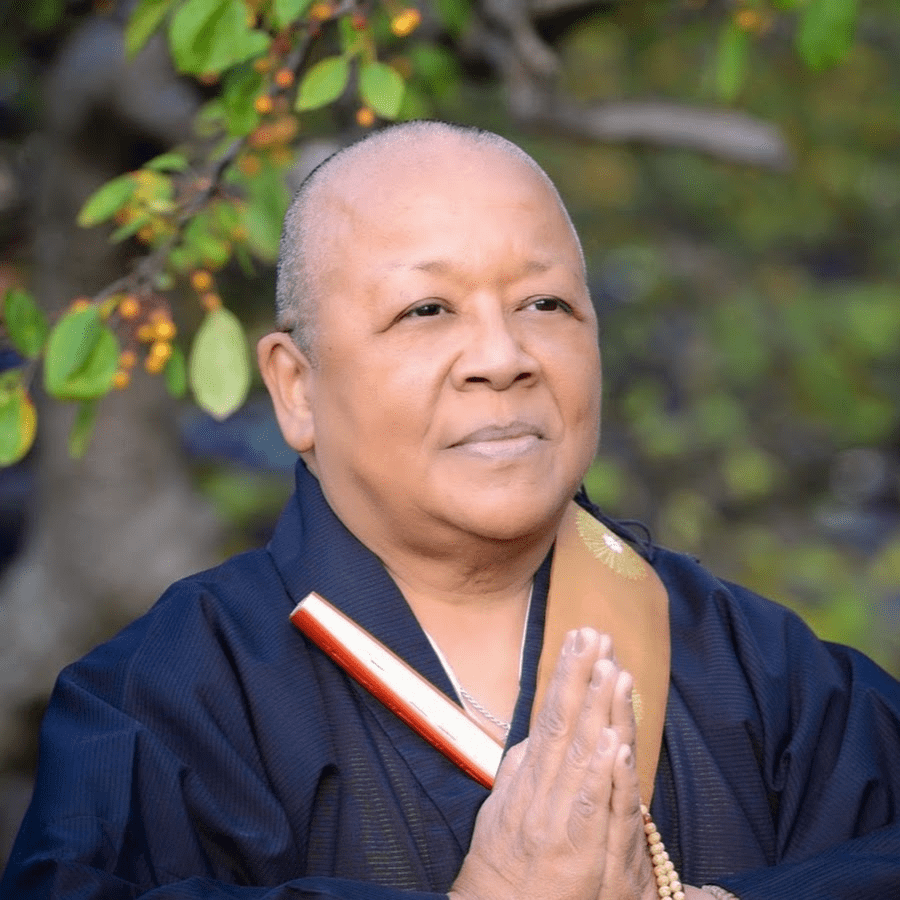Session Resources
Session Leader

Myokei Caine-Barrett, Shonin, first encountered Buddhism in 1963. She has been practicing the Lotus Sutra ever since. In 2002 she began training to become a priest. She became head priest and guiding teacher of the Nichiren Buddhist Sangha of Texas in Houston, also known as Myoken-ji Temple, in 2007. Myokei Caine-Barrett has active prison and hospice ministries and deeply committed to healing our culture. She is currently bishop of the Nichiren Shu Order of North America.
Opening the Space
We invite you to open your engagement with each session (or group gathering, if applicable) by practicing a Living Earth Acknowledgment. A Living Earth Acknowledgement can nourish our relatedness and avail us to truths beyond domination. Incorporating our ecological nature as well as the calls of justice, it is an exploration, not a formula, to recognize and remember. Through practices like this, we are setting the conditions for shifting minds that are conditioned by domination into more skillful ways of seeing, speaking and acting.
Living Earth Acknowledgment and Prayer
Meditation is an integral part of the EcoSattva journey. If you do not have a meditation practice, now is the perfect time to start. We invite beginners and seasoned practitioners alike to view this guided meditation grounded in our relationship with Earth, created especially for EcoSattva Training participants by our guiding teacher Catherine McGee.
Dharma Offerings
Introduction with Lou Leonard
To view videos in full screen, click the expand button ![]() on the lower right.
on the lower right.
Featured Guest: Myokei Caine-Barrett
EcoSattva Vows Ceremony (see the EcoSattva Vows phrases here)
Closing with Kristin Barker (see the Dedication of Merit phrases here)
Inquiries
We offer here a set of inquiries and group practices that support this step in our journey. Consider these suggestions and feel free to customize, replace and augment. But we strongly suggest that you explore at least one inquiry with each session.
Below are this session’s inquiry questions in bold, followed by a short commentary. We invite you to gently hold these questions. If this form of exploration is new to you or you would like a refresher, you can learn more about inquiry practice here.
- What has shifted for me through this journey, and what has stayed constant?
Take a moment to reflect on your experience in this training, through the descent, abiding with uncertainty, and the reemergence, the letting go, being with, and letting come. What changes do you notice within you, and in your relationship to others and the world? What has subsided, what has strengthened, and what remains the same for now? - What comes up when I contemplate hiei, that is, “jumping unreservedly” into working as sangha?
Myokei suggests that in relating to our communities, we could be as a parent who would do anything to save their child’s life. What arises for you as you imagine this wholehearted commitment to working with sangha? - How might I carry the EcoSattva Vows with me?
Reflecting on the EcoSattva Vows, which of these resonate strongly with you? If you feel called to use them going forward, how might you customize them to be more powerful for your practice and engagement?
Format for group inquiry: Liberating Structures is an excellent resource and we especially like 1-2-4-all and Conversation Café.
Course Survey
It would be enormously helpful to us if you could take 15 (or even five) minutes to provide feedback on the EcoSattva Training. Please complete our brief survey about your experience.
